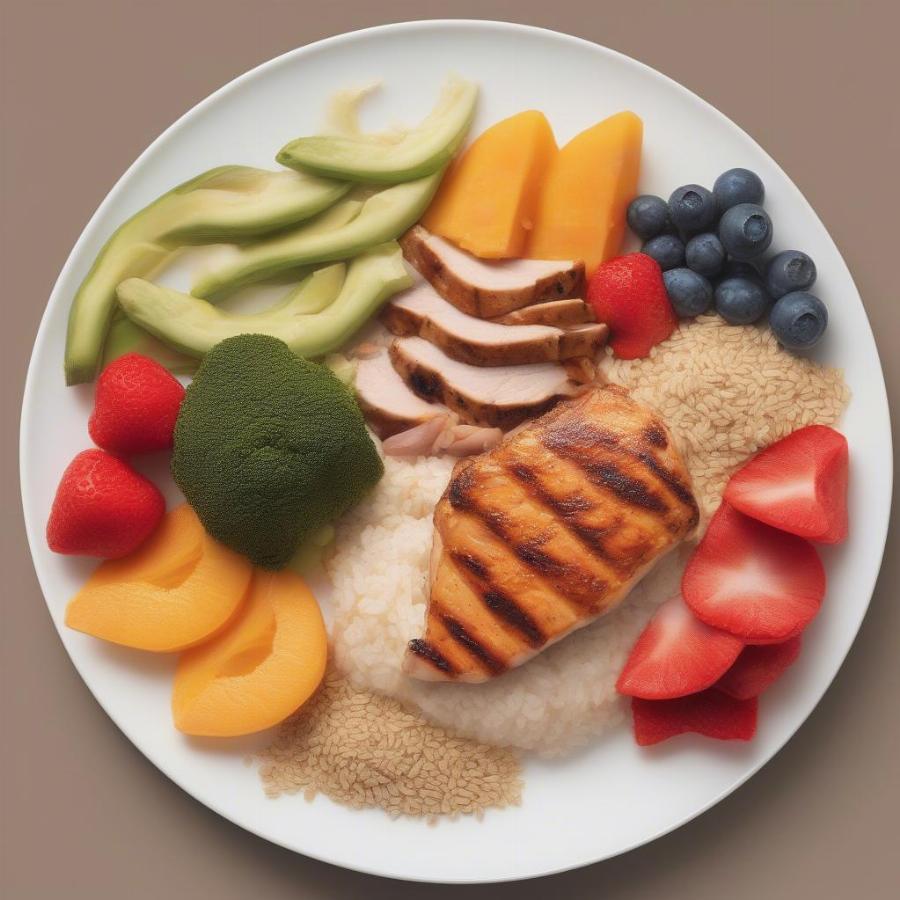How to Lose a Pound a Day for 30 Days: Separating Fact from Fiction

Losing a pound a day for 30 days is a dramatic goal. While rapid weight loss can be tempting, it’s crucial to approach this topic with a healthy dose of realism and prioritize sustainable, long-term health over quick fixes. Let’s explore the science behind weight loss and discuss safe and effective strategies for achieving your weight goals.
Similar to how to lose 3 pounds in 3 days, losing weight quickly requires creating a significant calorie deficit. This means burning significantly more calories than you consume. A pound of fat is equivalent to approximately 3,500 calories. To lose a pound a day, you would need to create a daily deficit of 3,500 calories.
Is Losing One Pound a Day Realistic?
The short answer is: for most people, no. While it might be possible for a very short period under strict medical supervision for individuals with a significant amount of weight to lose, sustaining this level of weight loss for 30 days is generally unhealthy and unsustainable. Rapid weight loss can lead to nutrient deficiencies, muscle loss, metabolic slowdown, and even gallstones. It can also negatively impact your energy levels and overall well-being. Aiming for 1-2 pounds of weight loss per week is a much healthier and more achievable target. This approach focuses on creating gradual, sustainable changes to your diet and lifestyle.
Healthy Strategies for Sustainable Weight Loss
While losing a pound a day for 30 days isn’t recommended, you can still make significant progress towards your weight goals by adopting healthy habits. Here’s what you can focus on:
-
Balanced Diet: Focus on whole, unprocessed foods like fruits, vegetables, lean protein, and whole grains. This approach provides your body with essential nutrients while naturally controlling your calorie intake. Limit processed foods, sugary drinks, and excessive amounts of unhealthy fats.
-
Regular Exercise: Aim for at least 150 minutes of moderate-intensity aerobic activity or 75 minutes of vigorous-intensity aerobic activity per week. Include strength training exercises at least two days per week. Exercise not only burns calories but also boosts your metabolism and improves your overall health.
-
Mindful Eating: Pay attention to your hunger and fullness cues. Eat slowly and savor your meals. Avoid distractions while eating.
-
Hydration: Drink plenty of water throughout the day. Water helps you feel full, aids digestion, and supports overall bodily functions.

Setting Realistic Goals and Tracking Progress
Setting achievable goals is key to long-term success. Instead of focusing on losing a pound a day, break your larger goal into smaller, more manageable steps. For instance, aim to lose 1-2 pounds per week. Track your progress by monitoring your weight, measurements, and how your clothes fit. Celebrate your milestones to stay motivated. This process helps you see that even small changes accumulate over time to produce significant results.
The Importance of Professional Guidance
If you’re struggling with weight loss, consult a registered dietitian or a healthcare professional. They can help you create a personalized plan that is safe, effective, and tailored to your individual needs and health conditions. This includes identifying any underlying health issues that may be contributing to weight gain. Remember, a personalized plan is often the most effective route to achieving your goals.

Is Rapid Weight Loss Ever Safe?
There are limited circumstances where rapid weight loss may be medically necessary, such as before certain surgeries. However, this type of rapid weight loss is always supervised by a medical professional and involves very specific dietary restrictions and monitoring. It’s crucial to remember that these are exceptions, and rapid weight loss is generally not recommended for the average person.
Addressing Common Misconceptions
Many fad diets and quick-fix solutions promise rapid weight loss, but they are often unsustainable and can even be harmful. These methods typically involve extreme calorie restriction or eliminating entire food groups, which can lead to nutrient deficiencies and other health problems. Remember that sustainable weight loss is about making long-term lifestyle changes rather than resorting to quick fixes.
This is similar to information you can find on pages like how can i lose 5 pounds in a day. While rapid weight loss may seem appealing, a balanced approach is essential for lasting results.

The Power of Long-Term Lifestyle Changes
True, lasting weight loss is achieved through gradual and sustainable lifestyle changes. This includes adopting a balanced diet, engaging in regular physical activity, managing stress levels, and prioritizing sleep. This approach leads to long-term health benefits and helps you maintain a healthy weight for life.
For those looking to establish a sustainable workout routine, exercise for weight loss in 7 days can provide some helpful starting points. Remember, consistency over time is key.
Conclusion
Losing a pound a day for 30 days is an unrealistic and potentially unhealthy goal. Focus on sustainable lifestyle changes, including a balanced diet and regular exercise, to achieve long-term weight loss and improve your overall health. Consult with a healthcare professional for personalized guidance and support.
FAQ
- What is a healthy rate of weight loss? A healthy rate of weight loss is generally 1-2 pounds per week.
- Can I lose weight without exercising? While exercise is important for overall health, you can lose weight through dietary changes alone. However, combining diet and exercise is the most effective way to lose weight and keep it off.
- What are some healthy snacks for weight loss? Healthy snacks include fruits, vegetables, nuts, yogurt, and hard-boiled eggs.
- How can I stay motivated to lose weight? Set realistic goals, track your progress, and celebrate your achievements. Find a support system and focus on the positive changes you’re making to your health.
- Is it okay to have cheat meals? Occasional cheat meals can be part of a healthy eating plan, as long as they are enjoyed in moderation.
- How important is sleep for weight loss? Adequate sleep is essential for weight loss and overall health. Lack of sleep can disrupt hormones that regulate appetite and metabolism.
- What are some common weight loss mistakes to avoid? Common mistakes include skipping meals, relying on fad diets, and setting unrealistic goals.
- How can I manage cravings? Manage cravings by staying hydrated, eating regular meals, and getting enough sleep.
- What role does stress play in weight gain? Stress can lead to increased cortisol levels, which can contribute to weight gain.




